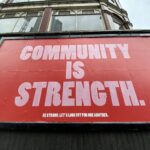Editor’s Note: Last week I wrote about the challenges I see in responding to the threat White Christian Nationalism presents to our democracy. This week, a friend and retired Lutheran pastor Mark Docken, provides a thoughtful explanation of why understanding and responding to Christian Nationalism is complex and important.
The redwoods are on fire in California. A flood submerges a neighborhood
That sat quiet on the coast for three centuries. A child takes their first steps
And tumbles into a father’s arms. Two people fall in love
Under an oak tree whose branches bend like sorrow.
This is the beginning of the poem “All at Once” by Clint Smith and it suggests to me that we are most healthy when we acknowledge or even embrace that life is simultaneously good and bad, joyous and suffering, prosperous and despairing. We get in trouble when we live in the illusion of isolating one and denying the other. Either we become arrogant and complacent and uncompassionate, or we wallow in despair, hopelessness, and lack of resilience.
I am guided in this by my spiritual roots in Martin Luther’s tenet that we are simul iustus et peccator (simultaneously saint and sinner). This is a both/and approach in understanding who we are in God’s eyes. This is a hard balance to hold. We tend to “fall off the horse” on one side or the other, either lost in shame and guilt or nestled in self-righteousness. If we hold it as a both/and, we live in love and freedom as forgiven sinners.
This importance of embracing the “both/and-ness” of life is crucial to our understanding of our national identity. As Clint Smith stated in a webinar with the Institute for Common Power: We need to recognize “how America is a place that provided unparalleled and unimagined opportunities for millions of people across generations in ways that their own ancestors could never have imagined.” And that “it has also done so at the direct expense of millions and millions of other people who have been intergenerationally subjugated and oppressed.” Without the “both/and” of our nation’s history, we cannot be healthy as a society. We become isolated from each other in privilege and disadvantage, opportunity and obstacles, self-congratulation and self-loathing.
More specifically, in regards to the resurgence of Christian nationalism, we need to embrace the “both/and”. Christianity is called both to the great good of speaking truth to power in the public square and to recognize the great harm of aligning religion with power. Our country is both steeped in religious commitment and in freedom of and even from religion. Our country did arise out of many Christian settlers with strong religious values. Most of the founders of the United States saw the importance of religion for the cohesion of the democracy. However, at the same time, the country was founded on the desire to break from European state religion and to foster freedom of religion. Also, many of the founders were more Deist than Christian, not understanding God to be involved in the workings of the world and certainly not incarnate in a person called Jesus.
Christianity has a long history of not doing well when aligned with state power. It loses its grounding in love and freedom and turns more and more toward judgment and control. Examples of this abound. The Christian Church played a terrible role in the genocide and oppression of indigenous peoples in the Americas, and Martin Luther sided with the German princes against the peasants resulting in a massacre in 1525.
Part of the “both/and” aspect of this is that too many religious people in America and around the world have been so zealous against the harm of established religion that they have failed to speak of their faith in the public square. This has created a vacuum of secularity that has been filled by far-right religious groups.
Christianity is at its best when it is a counter-cultural community instead of imposing itself upon culture. Within Christianity is a clear call to speak truth to power; to call to account the rich and powerful on behalf of the poor and marginalized. But Christianity is not to seek or secure status or privilege on its own behalf. Speaking truth to power in the public square is the most patriotic and nation-loving action a Christian can do. To conflagrate Christian and national identity is neither Christian nor patriotic and engages in idol worship. The end result of not holding in tension the “both/and” of Christianity’s relationship to the public square is that religion is used by the powerful for its own ends and the “evangelium” (good news) loses its authenticity.
The history of Christian nationalism is not a proud history. It inevitably deteriorates into oppression and protectionism. My wife and I have been watching the PBS documentary: The U.S. and the Holocaust. Elements of Christian nationalism fueled anti-Semitism that resulted in the U.S doing little to help the plight of millions of Jews trapped in Nazi Germany. Let us do all we can to combat the present resurgence of Christian nationalism.
Let Christians protect the “both/and” of religious commitment and freedom of religion. Let Christianity both promote the good of being active in the public square, and guard against the evil of seeking to rule in the public square.




0 Comments